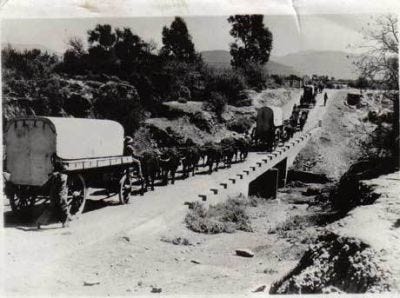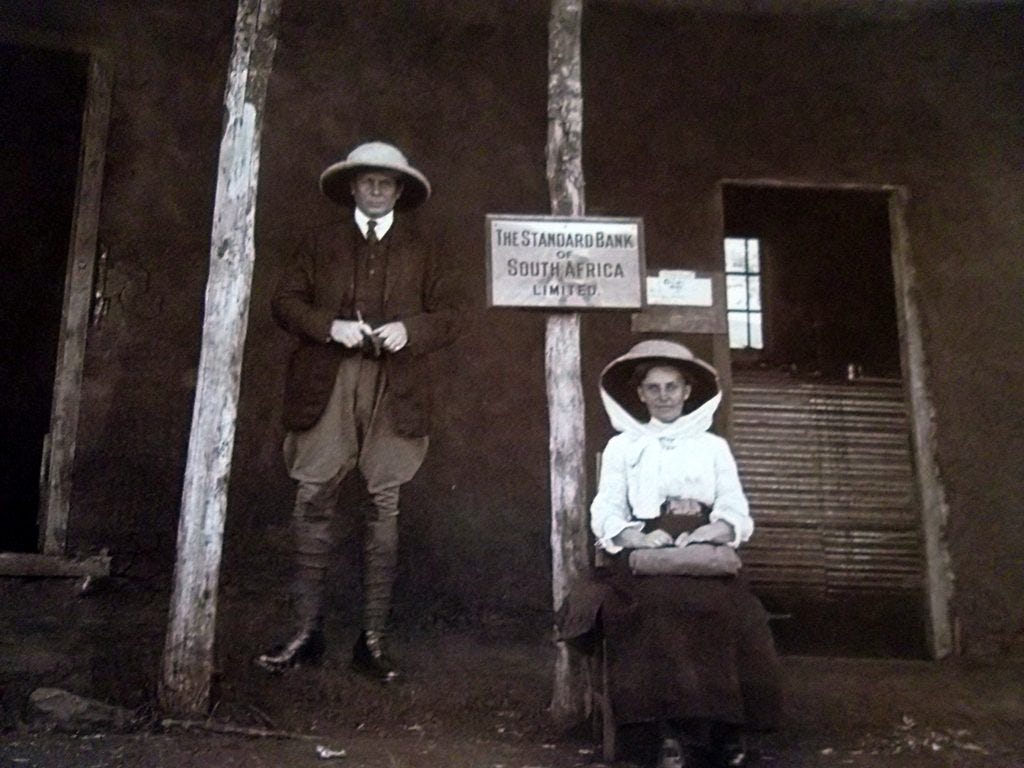Boer origins of Eldoret town, its Bar with no door and other stories
This was the only town in Kenya that was started by South African Boers

Of all the fancy and clumsy stories about origins of some Kenyan towns that I have come across, the once Boer town of Eldoret has the best.
This was the only Kenyan town that ostensibly had a bar that was never manned! Revelers would just go in, take beer and leave the money at the counter- and if they needed change they would take the exact amount and stagger to the hyena-laden fields of Farm 64 as the emerging town was known then.
The story is told of how two thirsty revelers found that one of their own had accidentally locked the padlock and they broke the door, took their beer, paid as usual and left. For years, the story goes on, the bar operated without a door.
But that is as far as the juicy stories of Eldoret go. Perhaps it happened, or it is one of those Happy Valley tales.
Eldoret is one of the only towns in Kenya that was founded by South African Boers who had escaped British rule after Anglo-Boer War. It is now known that the the Van Breda brothers - Bon, Dirk and Piet - and who arrived in 1902 were the first Boers to settle in Uasin Gishu in 1903. Here, they started experimenting with wheat but they collided with the locals and Bon was killed.
While the next group was composed of Frans Arnoldi’s family which arrived in 1905, the first big influx was in 1908 when 47 families of approximately 200-300 people reached Kenya from South Africa with prefabricated houses, wagons, and ploughs, and started a mighty trek to the highlands looking for a place to settle. Here, near Eldoret, they found something akin to the velds of South Africa where they had fled from fearing to be colonized by the British.
Led by Meneer Van Rensberg the group had arrived in Mombasa aboard a chartered German Boat “Windhoek” – on June 1908 and reached Nakuru on July 18, 1908. It was at Nakuru that the 47 families dispersed to different routes but most veered towards modern day Eldoret with some 42 wagons.
Colonial writer, Elspeth Huxley in her book "No Easy Way" captured the drama: "To get heavily-loaded wagons up this steep escarpment along the rough, narrow, treacherous track, with inexperienced oxen and in a wet year, was a truly remarkable feat, and only Afrikaners could have performed it...."
There was another group that had trekked to Tanganyika (now Tanzania) and later settled in Thika (where they grew pineapples) and in Athi Plains where they started ranches.
The only reason that the Boers were accepted by other whites in the Eldoret area was because they could plough farms with oxen since there were no tractors in the Protectorate then. Some Boers, who did not engage in farming, ran ox-wagon taxi businesses and the best known in the colony was J.H. Engelbrecht who plied his ox-wagon between Nairobi and Nyeri.
With locals, Boers, and British settlers competing for space, Eldoret, hitherto a grazing land, became the epicenter of colonial notoriety, murders, rape and chicanery as the Boers shot the locals and pushed the Maasai out to create what they called “breathing space.”

It was in the Uasin Gishu plateaus that the group, interestingly aided by gun totting British rogues, that they managed to push out the Maasai to create what they called “breathing space” .
Famous American travel writer Negley Farson, in his 1947 book "Last Chance In Africa" says that Eldoret to the Boers looked like “ their beloved kopjes in the Transvaal -- they out-spanned at once, saying: 'Here is a land where our women can breed in space' ...
But why did they pick Eldoret? There is one story that has been passed on for generations.
It is said that one of the wagons that made it to Eldoret was carrying a heavy safe that collapsed at the site of Eldoret. An attempt by the Boers to lift it back to the wagon failed and they decided to build a bank around the safe!
By this time most of the best land had been grabbed by the whites who had christened the entire area “white highlands” and wanted to lock out ownership from everyone else. That is how the Nandi lost most of their land here.
Of course the Boers were no ordinary settlers but cowards fleeing Anglo-Boer war racists and bullies. It was the Nandi who paid a heavy price dealing with them.
The British also had no time for the Boers who had taken up farms here that had been surveyed by the Royal engineers.
Farm 64 had been allocated to a Boer named Willie van Aardt and it was him who built the first post office since he could not make a living out of the farm. Thus, the story of Eldoret township started after Aardt started getting applications for business plots on the farm.
The British administration sent one of its administrators, N.F. Corbett to build a stone house opposite the New Lincoln Hotel. It was opposite here that they build a corrugated iron police station and a District Commissioners residence from the remaining material.
All this time, Eldoret had no name and was just Farm 64 and farmers had to be summoned by Governor, Sir Percy Girouard to give it a name.
The names suggested included Girouardfontein, Sirikwa, Sosiani, Bado Kidogo, and finally, Eldare. It was the governor who suggested that a ‘t’ be inserted at the end to read Eldaret but due to a typing error in the official gazette the name was spelt “Eldoret” in the gazette notice of January 1, 1912 and it was never rectified!
Eldoret was the new promised land for the Boers. “A visitor might have imagined himself in a Transvaal dorp, seeing the bearded Boers walking beside their long spans…,” one writer observed.
The Bank built by the Boers became The Standard Bank but the Cape Town office allegedly refused to approve the premises unless bars were fitted in the windows.

Historian, A.T. Mason captures what happened: “ all the paraphernalia of city banking arrived, including a brass plate which was quickly affixed to the mud and wattle wall. On one occasion its manager J.C Shaw (pictured above with his wife) told the office boy to patch the flaking mud but the Swahili of both the manager and the worker was meager with the result that when Shaw returned he found the wall had disintegrated under repeated onslaughts with buckets of water and the safe was outside in the mud!”
It is said that because there was no accommodation in Eldoret, some of the customers slept at the counter and took their morning bath at the bank or at a bar next door known as The Eddy’s. It is the Eddy’s that had been broken into by the revelers to have a beer.
Unlike other towns Eldoret used the Kruger coins as its currency and its District Commissioner had very little hold of the Boers. As a result, the town was basically neglected and the public works department did not encourage stone buildings - hoping that the town would one day shift.
Again, the DC had to refer all decisions to Naivasha or Nairobi and had no powers on the Boers. Following the Bon van Breda’s murder by the Nandi- the Boers decided to join hands and intimidate the DC with guns and horses to start an inquiry. A KAR regiment was sent from Nairobi to quell the situation. In 1913, the first DC resigned protesting his inability to deal with the Boers.
But it rose to service the agricultural farms with fuel and as a post office and by 1924 the railway arrived connecting the town to the coast.
The Boers built Highland School (now Moi Girls or White Highlands), and the Britons built Hill School for the children. For recreation, the Boers had Wagon Wheel Hotel, and the Britons had Lincoln Hotel.
In the heart of town is the 100-year-old Emmanuel Dutch Reformed Church, built by Willem de Klerk, the preacher grandfather of former South African President Frederick de Klerk.
Even today, the Boer legacy on this town can be seen in the old buildings, churches and cemeteries.




Corrections addressed to John Kamau
Wrong
The Armed Boers protested to colonial DC in Eldoret against Killing of Bon Van Breda in 1907
Correct
The armed Boer protesters marched to Tambach district headquarters of Elgeyo Marakwet to raise concerns on slow action taken by the government against the muderers of Van Breda
Wrong
The NGK or Dutch Reformed Church in Pioneer was built by Boers and was first admistered by reverend MP Loubser and not Declerc grand father as many people think
Amazing the church is still there will visit and send you a picture